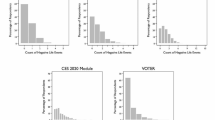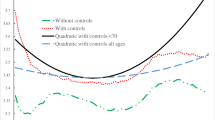Abstract
Does political participation make individuals more satisfied with their lives? Scholars of classical philosophy and participatory democracy suggest that participation in political activities is indeed a fundamental tenet of individual wellbeing. However, even though political participation is one of the most intensively studied topics in political science for decades, the relationship with individual wellbeing only recently started to gather some attention. So far, the existing empirical research has come to inconclusive results. In this study, we first re-examine the theoretical relationships between political participation and wellbeing. Secondly, using panel data from the Netherlands, we assess empirically the causal relations between taking part in political activities and individual life satisfaction. We give special attention to the role of political efficacy in this relationship. Employing structural equation modeling and correcting for measurement error, we find no evidence of a substantive effect of political participation on life satisfaction.


Similar content being viewed by others
Notes
The LISS panel core study consists of 11 different topics, distributed monthly throughout the year. In wave 1 and wave 2, the modules about politics and personality, of which we make use here, were signed out to the respondents respectively in December (2007, 2008) and May (2008, 2009).
The other political participation activities are: by making use of radio, television or newspaper; contacted a politician or civil servant; and participated in a political discussion or campaign by Internet, e-mail or SMS
References
Abramson, P. R., & Aldrich, J. H. (1982). The decline of electoral participation in America. The American Political Science Review, 76, 502–521.
Alwin, D. F. (2007). Margins of error: A study of reliability in survey measurement. Hoboken: Wiley. doi:10.1002/9780470146316.
Arrow, K. J. (1950). A difficulty in the concept of social welfare. Journal of Political Economy, 58(4), 328–346.
Barnes, S., Kaase, M., et al. (1979a). Political action: Mass participation in five western democracies. Beverly Hills: Sage.
Barnes, S., Farah, B., & Heunks, F. (1979b). Personal dissatisfaction. In S. Barnes, M. Kaase, et al. (Eds.), Political action: Mass participation in five western democracies. Beverly Hills: Sage.
Dahl, R. (1989). Democracy and its critics. New Haven: Yale University Press.
Diener, E. (Ed.). (2009). The science of wellbeing: The collected works of Ed Diener. New York: Springer.
Dutt, A., & Radcliff, B. (Eds.). (2009). Happiness, economics and politics: Towards a multi-disciplinary approach. Cheltenham: Edward Elgar.
Finkel, S. (1985). Reciprocal effects of participation and political efficacy: a panel analysis. American Journal of Political Science, 29, 891–913.
Finkel, S. (1987). The effects of participation on political efficacy and political support: evidence from a West German panel. Journal of Politics, 49(02), 441–464.
Flavin, P., & Keane, M. (2012). Life satisfaction and political participation: evidence from the United States. Journal of Happiness Studies, 13(1), 63–78.
Helliwell, J. F. (2006). Well-being, social capital and public policy: what’s new? The Economic Journal, 116, C34–C45.
Ikeda, K., Kobayashi, T., & Hoshimoto, M. (2008). Does political participation make a difference? The relationship between political choice, civic engagement and political efficacy. Electoral Studies, 27, 77–88.
Inglehart, R. (1977). The silent revolution: Changing values and political styles among western publics. Princeton: Princeton University Press.
Inglehart, R. (1990). Culture shift. Chicago: Chicago University Press.
Inglehart, R. (2006). Democracy and happiness: What causes what?. Paper presented at Conference on Human Happiness. Notre Dame University, October 22 – 24.
Inglehart, R., & Welzel, C. (2005). Modernization, cultural change, and democracy: The human development sequence. New York: Cambridge University Press.
Jöreskog, K., & Sörbom, D. (2005). LISREL 8.57.. Lincolnwood: Scientific SoftwareInternational, Inc.
Klandermans, B. (1989). Does happiness soothe political protest? The complex relation between discontent and political unrest. In R. Veenhoven (Ed.), How harmful is happiness? Consequences of enjoying life or not. Rotterdam: Universitaire Pers Rotterdam.
Niemi, R. G., Craig, S. C., & Mattei, F. (1991). Measuring internal political efficacy in the 1988 National Election Study. The American Political Science Review, 85, 1407–1413.
Oishi, S., Diener, E., & Lucas, R. E. (2007). The optimal level of well-being: Can we be too happy? Perspectives on Psychological Science, 2, 346–360.
Pacek, A. C. (2009). Politics and happiness: An empirical ledger. In A. K. Dutt & B. Radcliff (Eds.), Happiness, economics and politics. Cheltenham: Edward Elgar.
Pacheco, G., & Lange, T. (2010). Political participation and life satisfaction: a cross-European analysis. International Journal of Social Economics, 37(10), 686–702.
Parry, G. (ed.) (1972). The idea of political participation. In Participation in politics. Parry, G (ed.). Manchester: Manchester University Press.
Peterson, C. (1999). Personal control and well-being. In D. Kahneman, E. Diener, & N. Schwarz (Eds.), Well-being: The foundations of hedonic psychology. New York: Russell Sage.
Pichler, F., & Wallace, C. (2009). Social capital and social class in Europe: the role of social networks in social stratification. European Sociological Review, 25(3), 319–332.
Putnam, R. (2000). Bowling alone: The collapse and revival of American community. New York: Simon & Schuster.
Revilla, M., & Saris, W. E. (2012). A comparison of the quality of questions in a face-to-face and a web survey. International Journal of Public Opinion Research. doi:10.1093/ijpor/eds007.
Saris, W. E. (2008). Alternative measurement procedures and models for political efficacy. Unpublished manuscript. Barcelona: ESADE.
Saris, W. E., & Gallhofer, I. N. (2007). Design, evaluation, and analysis of questionnaires for survey research. Hoboken: Wiley.
Saris, W. E., Satorra, A., & van der Veld, W. (2009). Testing structural equation models or detection of misspecifications? Structural Equation Modelling: A Multidisciplinary Journal, 16(4), 561–582.
Schultz, W. (2005). Political efficacy and expected political participation among lower and upper secondary students: A comparative analysis with data from the IEA civic education study. Paper for the ECPR General Conference in Budapest, September 2005.
Schumpeter, J. (1942). Capitalism, socialism and democracy. London: Allen & Unwin.
Stutzer, A., & Frey, B. S. (2006). Political participation and procedural utility: an empirical study. European Journal of Political Research, 45, 391–418.
Teorell, J. (2006). Political Participation and three theories of democracy: a research inventory and agenda. European Journal of Political Research, 45, 787–810.
Teorell, J., Torcal, M., & Montero, J. R. (2006). Political participation: Mapping the terrain. In J. van Deth, A. Westholm, & J. R. Montero (Eds.), Citizenship, involvement in European democracies. A comparative analysis. London: Routledge.
Van der Veld, W., Saris, W. E., & Satorra, A. (2008). Judgement rule aid for structural equation models version 3.0.4 beta.
van Deth, J.W. (2001). The proof of the pudding: social capital, democracy, and citizenship. Paper presented at the ESF/EURESCO conference Social Capital — Interdisciplinary Perspectives — a Euro Conference, Exeter, September 15–20.
van Deth, J., & Maloney, W. (Eds.). (2011). New participatory dimensions in civil society: Professionalization and individualized collective action. London: Routledge.
Veenhoven, R. (1988). The utility of happiness. Social Indicators Research, 20(4), 333–354.
Verba, S., & Nie, N. (1972). Participation in America. New York: Harper and Row.
Verba, S., & Nie, N. (1987). Participation in America: Political democracy and social equality. Chicago: Chicago University Press.
Warren, M. (1992). Democratic theory and self-transformation. The American Political Science Review, 86, 8–23.
Weitz-Shapiro, R., & Winters, M. S. (2011). The link between voting and life satisfaction in Latin America. Latin American Politics and Society, 53(4), 101–126.
Author information
Authors and Affiliations
Corresponding author
Rights and permissions
About this article
Cite this article
Pirralha, A. Political Participation and Wellbeing in the Netherlands: Exploring the Causal Links. Applied Research Quality Life 12, 327–341 (2017). https://doi.org/10.1007/s11482-016-9463-x
Received:
Accepted:
Published:
Issue Date:
DOI: https://doi.org/10.1007/s11482-016-9463-x




